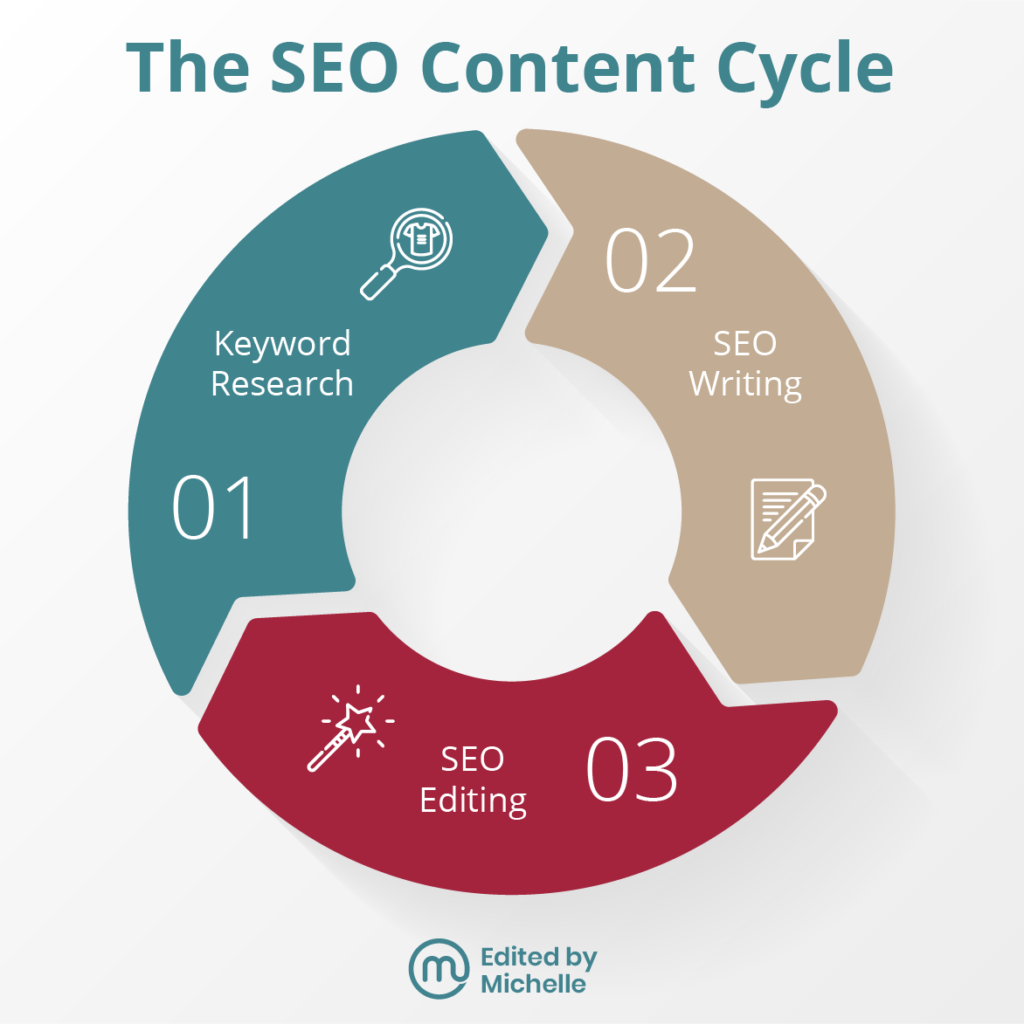I’m a professional editor. I edit websites.
I define editing as making writing better—making it more clear, concise, and compelling.
What is SEO editing? SEO editing is simply making online writing better—making it more clear, concise, and compelling … to search engines.
In this article, you’ll learn:
- Where SEO editing falls in the SEO content writing process
- My data-driven approach to SEO editing
- How-to tips on editing for SEO effectively
SEO Editing is the Final Step in the SEO Writing Process
After you’re done publishing a piece of SEO content, it’s important to check that search engines fully grasp what your content is about.
You can’t rank for your target keyword and related long-tail phrases if search engines can’t accurately parse what you’ve written.
Writing for the web is (at least) a three-step process … which repeats.

Step 1: Keyword Research
Keyword research simply means finding out which words people use to find content like yours online. Keyword research helps you identify which topics matter to your audience. Find your keywords and group them into topics.
Step 2: SEO Writing
SEO writing means writing with keywords in mind. Your goal is to write the best answer on the internet for the topic (a set of closely related keywords), not just one super-specific search phrase. Good SEO writing ranks for thousands of semantically related terms, and most of them aren’t included in the actual text.
The best SEO writing is thorough, focused, well structured, and well written.
(SEO writing is also repetitive, but in a good way.)
Don’t consider yourself a writer? I highly recommend Ann Handley’s Everybody Writes … it’s a down-to-earth guide to effective web writing.
Step 3: SEO Editing
Starting about a month or two after publishing (and then annually thereafter), check up on how your piece is doing. Is it showing up in Google searches for what you hoped it would? Fantastic. Maybe it’s even showing up for related, unexpected keywords as well.
The list of keywords that a webpage is showing up for lets you know how Google has interpreted your text.
Once you know what Google thinks your text is about, you can edit in a smart, data-focused way.
How to Edit for SEO
If your content is already showing up for your target keyword(s), then you want to preserve what is making it rank.
The first rule of SEO editing is to do no harm.
It’s always easier to optimize a text around keywords and keyphrases which Google has already deemed relevant for the content. Work with Google, not against it.
Now search your focus keyword(s). Read the top 5 to 10 results. What topics and sub-topics are your competitors covering that your article isn’t ? Really, how does your content compare?
Then edit your article. Refresh it. Make it better—more clear, more concise, and more compelling to people and to search engines.
Some SEO Editing Tips
How accurate is your headline? Make sure it elegantly includes your target keyword and introduces readers to what the page is about. If someone reads just the title of your post, they should have a pretty good idea of the main topic of the post. Misleading, clickbaity, or cute headlines can lead search engines to think your post is about something it’s not!
Next, focus on the introduction: Cut out all the fluff and the throat-clearing. Get straight to the point in the first 100 to 200 words. Provide value up front.
Strengthen your header structure: Readers (and search engines) should always be able to skim your headers and grasp the outline of your piece. Each header should succinctly introduce and summarize the content of the paragraphs which follow.
Add new content to address relevant subtopics and follow-up questions: If necessary, add to your post new subsections which your SERP competitors cover, but your article does not.
Sentence-level editing: Clarify and simplify your sentences. No one should ever have to read a sentence twice to understand it.
Lastly, proofread your content before re-publishing. Strictly speaking, proofreading doesn’t affect your SEO, but SEO editing that introduces new errors is a classic case of one step forward, two steps back.
But What If My Page is Not Ranking for Any Keywords at All?
No keywords? Don’t despair. There are lots of reasons why a piece of content doesn’t show up for what you want it to. 90% of blog posts get no love and no traffic from Google.
If your site is new (less than 6 months old), then just keep chugging along producing excellent audience-focused, keyword-targeted content on the regular.
However, if you have an older site and it’s still not showing up anywhere after a couple months, then there are a lot of possible reasons.
You might have picked a keyword/topic which is too competitive for your site.
Or maybe (if you’re honest) you realize that your piece really isn’t better than what is ranking now.
Or maybe the type of content you produced does not fit the type of content searchers want.
If you’re stumped, get a second opinion.
Figuring out why something isn’t ranking like you want it to is something an SEO can answer.
Does Keyword Density Still Matter?
Keywords matter, no question about that. But keyword density doesn’t matter nearly as much as you might think.
Using keywords in your text matters because using the language of your audience makes your readers feel at home. And frankly, sometimes we just need to throw Google a bone and make it super obvious which keywords we’re aiming for.
But Yoast (and other SEO tools and plugins) often give keyword density advice that’s a little ho-hum. It’s a little 1990s-style SEO, if you ask me.
Google is a semantic search engine now, which is just a fancy way of saying that Google understands topics and natural language better than ever before.
Keywords matter … but topics matter so much more.
So, while it’s important to use your target keywords in your text, it’s far, far more important that you write naturally and cover the topic thoroughly.
Make sure that your content meets the needs of the searcher.
Having subject matter expertise (itself just a fancy way of saying writing about things you actually know about) goes a long way.
Every time I edit an expert’s writing, I’m amazed at how naturally they’ve integrated everything that the fancy on-page SEO optimization tools recommend. They’re not keyword stuffing. They really just do know their stuff, and it shows in their writing.
And that, full stop, is why I’m an SEO editor and not an SEO writer. Experts come with their drafts and my role is simply to make sure that it’s presented in a way that makes their expertise crystal clear to search engines and their readers.
(A subject matter expert and an editor with a knowledge of SEO is a dangerously effective combination.)


